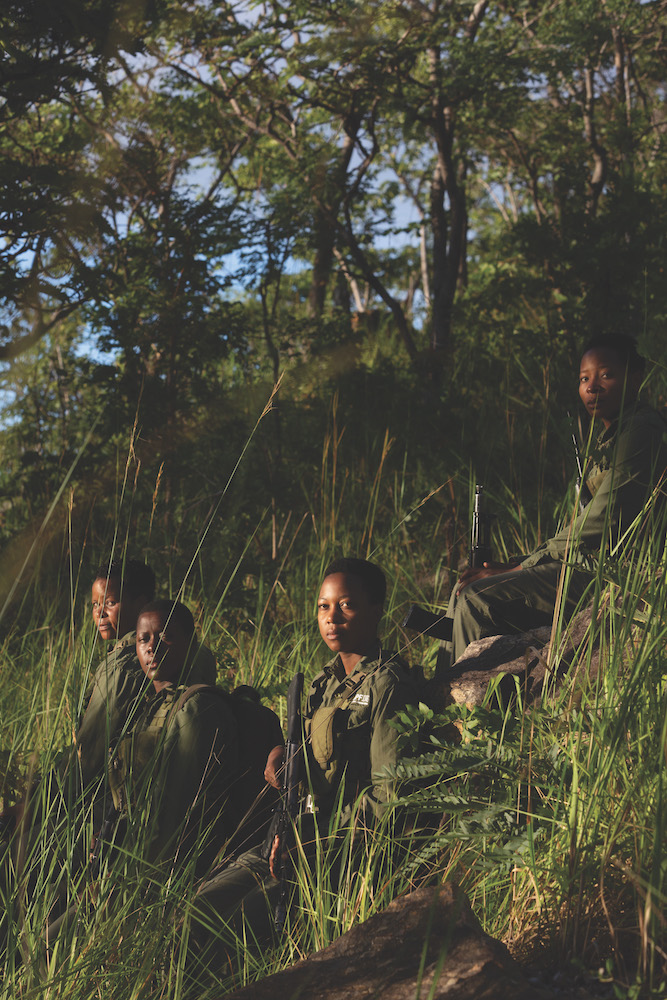‘The Brave Ones’:The Largest All-Women Anti-Poaching Unit in Africa

The line of green-clad rangers step carefully through the dense foliage of a forest in Zimbabwe, rifles bouncing on their backs. The lead ranger raises two fingers in the air, and they all stop. In a clearing ahead, an elephant steps forward, tail swishing, unaware it’s being watched.
These are the Akashinga, a Shona word meaning “the Brave Ones,” trained in and tasked with the protection of the biodiversity of their home forests. Since these rangers began their work in 2017, they have transformed the local model of anti-poaching enforcement. Wildlife encounters have increased by 400 percent, whereas in the 16 years prior to Akashinga’s involvement, Zimbabwe’s mid-Lower Zambezi Valley had previously lost 8,000 elephants (40 percent of the entire elephant population in the region). And elephant poaching in this region has decreased by a staggering 90 percent.
The difference? The rangers are all women.
“I see these animals as my children,” says Petronella Chigumbura, deputy ranger supervisor and one of the original 16 rangers who undertook this training. “I will do anything to protect them.”
Zimbabwe, where Akashinga got its start, is home to the world’s second-largest population of elephants, an endangered species threatened by worsening droughts. As populations decline, they become more valuable to poachers and the threat of illegal poaching there, and across Africa, can increase dramatically.
Leadership of the Land
“Training was extremely hard,” Chigumbura says. “Up to that point, I had only been responsible for doing the dishes.” Akashinga approached her in 2017, when she was 29, recently divorced, a mother of two, and a survivor of domestic violence.
Through rigorous courses, she and the other women in the first group of 16 trained for days at a time out in the bush, where they learned to detect signs of wildlife and identify snares and illegal logging as they moved through the wild as protectors and friends. Chigumbura discovered both a love of animals and a knack for leadership. In 2018, she was promoted to the leadership role of Deputy. She, and most of her colleagues from the initial 16, are now ascending through the ranks and training hundreds of new rangers each year.
A Community for Conservation
Conservation, Akashinga’s model shows, can build community. Everywhere they operate across the 9.1 million acres they are mandated to protect, Akashinga’s rangers commit to relationship building – working with local communities to find out their greatest needs. And then they work helping to address those needs. Akashinga has provided scholarship programs for education, drilled boreholes for clean water access, and they support local healthcare clinics that serve over 5,000 local citizens each month. They have also created an ethos of conservation. Schools now have environmental education, conservation clubs, and community gardens where children learn to garden and plant trees. “We asked little girls what they want to be when they grow up, and they said they wanted to be Akashinga Rangers,” Chigumbura proudly says.
“The Animals Are Coming Back”
From the frontlines of Zimbabwe’s wilderness, Chigumbura and her colleagues have witnessed something extraordinary: “The animals are coming back.”
But as the animals return, so do the poachers. With time come new, and growing, challenges: How do we adapt to worsening droughts? How do we train more rangers to mitigate these threats? And Zimbabwe is far from the only African nation with forests in desperate need of protection.
But Melody Westen, Akashinga’s executive director, notes, Akashinga can only grow as fast as their funding. And that will only come through spreading the message that protecting animals, conserving wilderness, and uplifting communities can all come together through a single force for good: women in conservation leadership roles.
Akashinga
Donate now!tgl.akashinga.org
(540) 316-0019
Development Officer: Andrea Enfield
Mission
Akashinga — formerly the International Anti-Poaching Foundation (IAPF) — is an innovative nature conservation organization that creates resilient ecosystems where nature, wildlife, and communities will thrive together for years to come.
Begin to Build a Relationship
We know you care about where your money goes and how it is used. Connect with this organization’s leadership in order to begin to build this important relationship. Your email will be sent directly to this organization’s director of development and/or Executive Director.